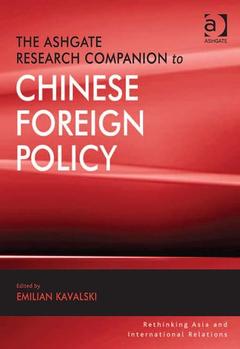Contents: Introduction: engaging China's foreign policy, Emilian Kavalski; Part I Historical and Analytical Perspectives on China's Foreign Policy: In quest of independence: an unchanging paradigm of China's foreign policy, Lai-Ha Chan; International status: China's pursuit of comprehensive superpower status, Mingjiang Li; China's strategic culture and foreign policy, Huiyun Feng; China's rise and international relations theory, Dingding Chen. Part II The Domestic Sources of China's Foreign Policy: The rise of nationalism and China's foreign policy, Kingsley Edney and Baogang He; Communist ideology and Chinese foreign policy, Winberg Chai; The 'new security concept': the role of the military in China's foreign policy, Yee-Kuang Heng; Economic development and China's foreign policy, Hongyi Lai and Su-jeong Kang. Part III The International Impact of China's Foreign Policy: Soft power in Chinese foreign policy: concepts, policies, and effectiveness, James Reilly; Religion, culture and Confucius Institutes in China's foreign policy, Kim-Kwong Chan and Alan Hunter; Overseas Chinese and Chinese foreign policy, John Lee; China and the global surge for resources, Carrie Liu Currier. Part IV China's Bilateral Interactions: The relations between China and the USA, Jian Yang; China's bilateral interactions with Russia, Susan Turner Haynes; Perspectives on China's relations with the European Union, Reuben Wong; Sino-Indian relations: peaceful coexistence or pending rivalry, Jing-dong Yuan. Part V China's Regional Strategies: China's relations with the Middle East: China’s relations with the Middle East, Niv Horesh; China’s relations with Central Asia (SCO), Russell Ong; China’s relations with Southeast Asia (ASEAN), Ming Te Hung and Mei-Hsien Lee; China’s relations with Northeast Asia, Enyu Zhang; China’s relations with Africa, May Tan-Mullins and Giles Mohan; China’s relations with Latin America, Tung-Chieh Tsai and Tony Tai-Ting Liu; Anchoring China’s oceanic re





